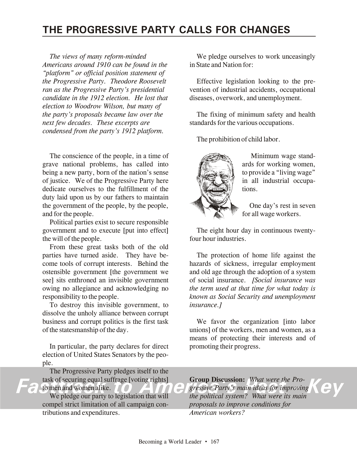| Fasttrack
to America's Past Teacher Key |
|
| Fasttrack
to America's Past Teacher Key |
|
 Page 167 |
Page 167 -
The Progressive Party Calls for Changes The reading selection Theodore Roosevelt reached the presidency by a quirk of fate, but left it changed forever. Politicians in his native New York State helped him land the vice-president spot under William McKinley, partly to get rid of him and his enthusiasm for the political and social reforms of the Progressive movement. When McKinley was assassinated in 1901, however, TR rose to the highest office in the land. He became known as the "trustbuster" for leading the attack on big businesses that abused their power by forming monopolies or near-monopolies. During a coal miners strike, he also became the first president to intervene in a labor dispute on the side of workers. Roosevelt, a Republican, was reelected in 1904 but did not run again in 1908. In 1912 he did run, this time on the Progressive Party ticket because he was unable to win the Republican nomination. The party's platform, condensed in the workbook, gives a good sense of the issues that concerned Roosevelt and other Progressives in the early 1900s. The picture Theodore Roosevelt, the reform minded president who served in the early years of the 20th century. The Panama Canal was one of the great accomplishments of his administration. Group discussion question Restoring good government, the Progressive Party says, would require getting more power in the hands of ordinary citizens. The party wanted direct election of U.S. Senators, who up to that time were selected by state legislatures. Progressives also wanted equal voting rights for women, and a limit on campaign contributions. The party platform declares
support for
many reforms aimed specifically at workers. The list includes
laws
to prevent factory accidents, occupational diseases, excessive work
hours,
and unemployment.
|
|
Copyright Notice
Copyright 2018 by David Burns. All rights reserved. Illustrations and reading selections appearing in this work are taken from sources in the public domain and from private collections used by permission. Sources include: the Dover Pictorial Archive, the Library of Congress, The National Archives, The Hart Publishing Co., Corel Corporation and its licensors, Nova Development Corporation and its licensors, and others. Maps were created or adapted by the author using reference maps from the United States Geological Survey and Cartesia Software. Please see the home page for this title for more information. |